
July 28
1868 Equality: 14th Amendment adopted:
Following its ratification by the necessary three-quarters of U.S. states, the 14th Amendment, guaranteeing to African Americans citizenship and all its privileges, is officially adopted into the U.S. Constitution.
Two years after the Civil War, the Reconstruction Acts of 1867 divided the South into five military districts, where new state governments, based on universal manhood suffrage, were to be established . . . The amendment resolved pre-Civil War questions of African American citizenship by stating that "all persons born or naturalized in the United States . . . are citizens of the United States and of the state in which they reside." The amendment then reaffirmed the privileges and rights of all citizens, and granted all these citizens the "equal protection of the laws."
1882 Wagner: The opera Parsifal is produced at Bayreuth:
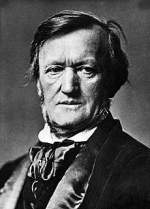
Wagner apologists have had to acknowledge Wagner's racism, since there is no way to deny something that was so well documented by Wagner himself. Recognizing that they cannot defend him on that ground, they then deny that any racism is expressed in his "music dramas". Some, after peeling away the veneer of fairy tales, are horrified at what they discover in the dramas, as was Thomas Mann in 1940. So, they then try to defend the music by divorcing it from the drama, which is completely contrary to the mandate of the composer's Gesamtkunstwerke (Total Works of Art), which will be respected here. They naively claim that music alone is amoral, i.e., that it cannot communicate any moral or political messages. As such, the operas are stripped down to mere tone relations in order to prevent and insulate them from the identification of possible racist propaganda.
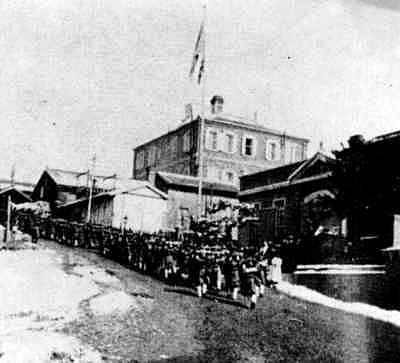
1894 First Sino-Japanese War (July 28–29): Major-General Oshima Yoshimasa leads 4,000 mixed Japanese and Korean troops on a rapid forced march from Seoul to face 3,500 Chinese troops garrisoned at Seonghwan Station. The Chinese gradually lose ground to the superior Japanese numbers, and finally retreat towards Pyongyang. Chinese casualties amount to 500 killed and wounded, compared to 82 Japanese casualties. (Sondhaus, Sedwick) [For further details, Click here.]
1914 World War I: Austria-Hungary declares war on Serbia:
On July 28, 1914, one month to the day after Archduke Franz Ferdinand of Austria and his wife were killed by a Serbian nationalist in Sarajevo, Austria-Hungary declares war on Serbia, effectively beginning the First World War.
Threatened by Serbian ambition in the tumultuous Balkans region of Europe, Austria-Hungary determined that the proper response to the assassinations was to prepare for a possible military invasion of Serbia. After securing the unconditional support of its powerful ally, Germany, Austria-Hungary presented Serbia with a rigid ultimatum on July 23, 1914, demanding, among other things, that all anti-Austrian propaganda within Serbia be suppressed, and that Austria-Hungary be allowed to conduct its own investigation into the archduke's killing. Though Serbia effectively accepted all of Austria's demands except for one, the Austrian government broke diplomatic relations with the other country on July 25 and went ahead with military preparedness measures. Meanwhile, alerted to the impending crisis, Russia—Serbia's own mighty supporter in the Balkans—began its own initial steps towards military mobilization against Austria.
In the days following the Austrian break in relations with Serbia, the rest of Europe, including Russia's allies, Britain and France, looked on with trepidation, fearing the imminent outbreak of a Balkans conflict that, if entered into by Russia, threatened to explode into a general European war. The British Foreign Office lobbied its counterparts in Berlin, Paris and Rome with the idea of an international convention aimed at moderating the conflict; the German government, however, was set against this notion, and advised Vienna to go ahead with its plans.
On July 28, 1914, after a decision reached conclusively the day before in response to pressure from Germany for quick action—apart from Kaiser Wilhelm II, who by some accounts still saw the possibility of a peaceful diplomatic resolution to the conflict, but was outmaneuvered by the more hawkish military and governmental leadership of Germany—Austria-Hungary declared war on Serbia. In response, Russia formally ordered mobilization in the four military districts facing Galicia, its common front with the Austro-Hungarian Empire. That night, Austrian artillery divisions initiated a brief, ineffectual bombardment of Belgrade across the Danube River.
"My darling one and beautiful, everything tends towards catastrophe and collapse," British naval official Winston Churchill wrote to his wife at midnight on July 29. He was proven right over the next several days. On August 1, after its demands for Russia to halt mobilization met with defiance, Germany declared war on Russia. Russia's ally, France, ordered its own general mobilization that same day, and on August 3, France and Germany declared war on each other. The German army's planned invasion of neutral Belgium, announced on August 4, prompted Britain to declare war on Germany. Thus, in the summer of 1914, the major powers in the Western world—with the exception of the United States and Italy, both of which declared their neutrality, at least for the time being—flung themselves headlong into the First World War. (History.com)
From Kaiser Wilhelm's Account of the start of the war:
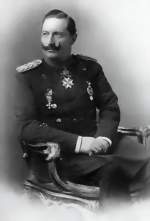
A monarch who wishes war and prepares it in such a way that he can suddenly fall upon his neighbours—a task requiring long secret mobilization preparations and concentration of troops—does not spend months outside his own country and does not allow his Chief of the General Staff to go to Carlsbad on leave of absence. My enemies, in the meantime, planned their preparations for an attack. Our entire diplomatic machine failed. The menace of war was not seen because the Foreign Office was so hypnotized with its idea of "surtout pas d'histoires" ("above all, no stories"), its belief in peace at any cost, that it had completely eliminated war as a possible instrument of Entente statesmanship from its calculations, and, therefore, did not rightly estimate the importance of the signs of war.

Fromelles Watercolor, 1915, by Hitler
1915 World War I: List Regiment: Gefreiter Adolf Hitler's 16 Reserve Infantry Regiment continue to occupy a position at Fromelles—pictured above in a drawing by Hitler—on a level field with water channels, willow trees and willow stalks, in the distance towards the enemy lines lie an insignificant wood with barbed wire entanglements. Under the direction of their defense-minded commander, Lieutenant General Gustav Scanzoni von Lichtenfels, the regiment works ceaselessly day and night to further fortify their position at Fromelles while fighting off repeated assaults by the enemy. [For further details, Click here.]
1916 World War I: Various:
Captain Charles Fryatt: One day after his execution by the Germans, the Official German Government Statement is released:
The accused was condemned to death because, although he was not a member of a combatant force, he made an attempt on the afternoon of March 20, 1915, to ram the German submarine U-33 near the Maas lightship. The accused, as well as the first officer and the chief engineer of the steamer, received at the time from the British Admiralty a gold watch as a reward of his brave conduct on that occasion, and his action was mentioned with praise in the House of Commons. On the occasion in question, disregarding the U-boat's signal to stop and show his national flag, he turned at a critical moment at high speed on the submarine, which escaped the steamer by a few metres only by immediately diving. He confessed that in so doing he had acted in accordance with the instructions of the Admiralty. One of the many nefarious franc-tireur proceedings of the British merchant marine against our war vessels has thus found a belated but merited expiation.
List Regiment: Gefreiter Adolf Hitler endures trench warfare in Flanders (Artois) with 3 Company, 16 Reserve Infantry Regiment [List Regiment]. [For further details, Click here.]
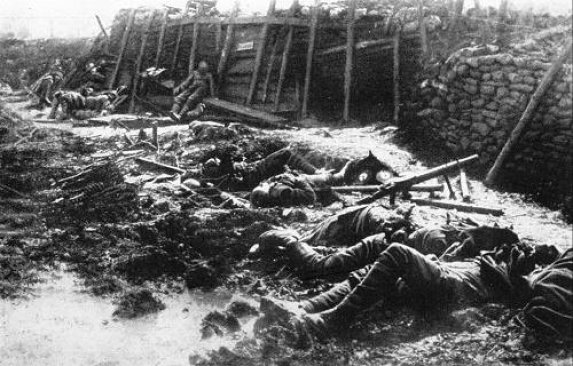
1917 World War I: List Regiment (July 22-August 3): Dispatch Runner Gefreiter Adolf Hitler serves at the front with 3 Company, 16 Bavarian Reserve Infantry Regiment during Phase 2 operations in Flanders. Most of their time in the trenches gas masks are worn, while English bombers and tanks—a new terror witnessed for the very first time by most—attempt to advance over a long front through seas of mud. [For further details, Click here.]
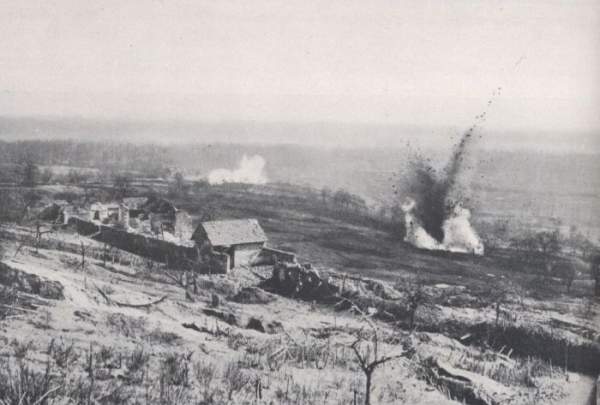
1918 World War I: List Regiment (July 20-August 4): Gefreiter Adolf Hitler's 16th RIR continues building a new line of defenses on the site of the failed Second Battle of the Marne. [For further details, Click here.]
1919 Various:
League of Nations: Jean Monnet, an acquaintance of Colonel Edward Mandell House, is appointed as Deputy Secretary of the new League of Nations. After World War II, Monnet will become known as the "Father of Europe."
I propose you bring to the partnership a strong, constructive concept as well as a determination to build up a stout external defence); the establishment of a structured Atlantic free world, accommodating the diversity of its three constituent parts, the United States, the British Empire, and continental Western Europe federated around an expanded Schuman Plan. We would transform our archaic social conditions and come to laugh at our present fear of Russia. The hope lies in the fact that the team leader is the United States
Volkishness: Sebottendorff leaves Munich and resigns as Grand master of the Thule Society. (THP)
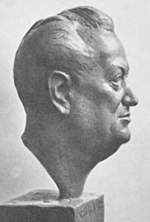
The Thule Gesellschaft was a front for a whole web of secret societies which had similar racist and anti-Semitic occultist roots. Among the members of these groups were influential people, like the political theorist Gottfried Feder, whose Hammer Union furnished cadres to the future Nazi Party. In this circle of initiates was also Hans Frank, a lawyer member of the Nazi party and future governor-general of Poland, who at that time was involved with a society for heraldic and genealogical research, headed by Dr. W. Daumenlang. Daumenlang was infatuated by his discovery of a swastika in the coat of arms of the Hohenzollern.
The initiative for the creation of the Thule Gesellschaft came from Baron von Sebbotendorf, head of the Bavarian branch of the Germanen Order. In the name of the Thule Gesellschaft, Sebottendorf bought the newspaper Voelkischer Beobachter, which later became the official Nazi Party journal. Dietrich Eckart, for many years Hitler's mentor, provided the money for the purchase.
1922 Weimar: Adolf Hitler gives an impassioned speech in Munich:
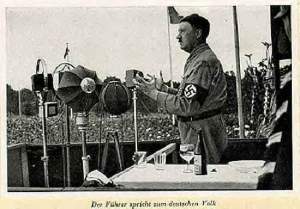
The directors of these institutions were, and are without exception, Jews. I say 'without exception,' for the few non-Jews who had a share in them are in the last resort nothing but screens, shop-window Christians. Christians one needs in order, for the sake of the masses, to keep up the appearance that these institutions were, after all, founded as a natural outcome of the needs and the economic life of all peoples alike. That they were not, as was the fact, institutions which correspond only with the essential characteristics of the Jewish people, and are the outcome of those characteristics.
1932 Great Depression: Bonus Marchers evicted by U.S. Army: President Herbert Hoover orders the U.S. Army under General Douglas MacArthur to evict by force the Bonus Marchers from the nation's capital.
Two months before, the so-called "Bonus Expeditionary Force," a group of some 1,000 World War I veterans seeking cash payments for their veterans' bonus certificates, had arrived in Washington, D.C. Most of the marchers were unemployed veterans in desperate financial straits. In June, other veteran groups spontaneously made their way to the nation's capital, swelling the Bonus Marchers to nearly 20,000 strong. Camping in vacant government buildings and in open fields made available by District of Columbia Police Chief Pelham D. Glassford, they demanded passage of the veterans' payment bill introduced by Representative Wright Patman.
While awaiting a vote on the issue, the veterans conducted themselves in an orderly and peaceful fashion, and on June 15 the Patman bill passed in the House of Representatives. However, two days later, its defeat in the Senate infuriated the marchers, who refused to return home. In an increasingly tense situation, the federal government provided money for the protesters' trip home, but 2,000 refused the offer and continued to protest. On July 28, President Herbert Hoover ordered the army to evict them forcibly. General MacArthur's men set their camps on fire, and the veterans were driven from the city. Hoover, increasingly regarded as insensitive to the needs of the nation's many poor, was much criticized by the public and press for the severity of his response. (History.com)
1933 Holocaust: The German state of Thuringia expels all Jewish teachers and orders disbandment of the Jewish Student's Association.
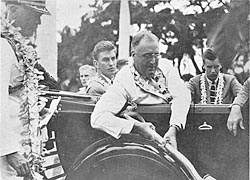
1934: President Franklin D. Roosevelt becomes the first US President to visit Hawaii. He "plants" a "lucky kukui tree." (Daws)
[See: Countdown to Infamy: Timeline to Pearl Harbor.] 1935 Automotive: Tazio Nuvolari triumphs over Germans at the Nurburgring:The Italian race car driver Tazio Nuvolari wins the greatest victory of his career in the Grosser Preis von Deutschland (German Grand Prix) held on the Nurburgring racetrack in Nurburg, Germany on this day in 1935.
The German Grand Prix of 1935 is remembered as Nuvolari's greatest victory, and arguably one of the most impressive auto racing victories of all time. At the time, German automakers reigned supreme in the world of race car construction, and the "home team" at the Nurburgring that July day consisted of five Mercedes and four German Auto Union vehicles, all of which overpowered Nuvolari's older . . . Alfa Romeo.
With one lap left to go, the German driver Manfred von Brauchitsch in his 445 bhp W25 Mercedes Benz--the most powerful car of the day--took a 35-second lead over Nuvolari; the rest of the field, competitive throughout, had fallen behind. Von Brauchitsch's left rear tire was fraying, however, and with Nuvolari in hot pursuit behind him he declined a pit stop: The tire blew, and von Brauchitsch was forced to slow to 40 mph and guide it to the rim of the track. Nuvolari blew past him for the win, to the great chagrin of the Nazi Party officials at the finish line who had already started to raise the flag of the Reich and prepare the celebration. [For further information, click here.]
1937 Japanese troops occupy Peking, the Chinese capital:
The imperial government was still dominated by militarists and committed to extension of Japan's borders by military force. In pursuance of this aim, the imperial government formulated the following major foreign policy objectives for Japan: Russian pressure on Japan's empire from the north needed to be resisted; the military conquest of the whole of China should be undertaken; and further territorial expansion to the south should be undertaken to seize for Japan the wealth and raw materials available in the South-East Asian colonies of Britain, France and Holland. [For further details, Click here.]
1941 World War II: Various:
Barbarossa: German troops begin to clear Soviet forces trapped in the Smolensk pocket:
The failure of the Germans to close the gap, and thereby allowing 200,000 Russians to escape, made Hitler give up on the concept of Battles of encirclement. 4 Weeks into the campaign and it was clear to Hitler and his high command that despite immense losses of men and material that the Soviet Union was not about to fall apart and the flanks of Army Group Center were now becoming increasingly vulnerable to Soviet counter attacks. Hitler decided that tanks from Army Group Center should be sent to Army Group North and South as Germany will defeat Russia by inflicting severe economic damage [See: What Were Adolf Hitler's Major Blunders?]
Finland ends diplomatic relations with Great Britain.
Hitler remains at Wolfsschanze (Wolf's Lair) until March 20, 1943.
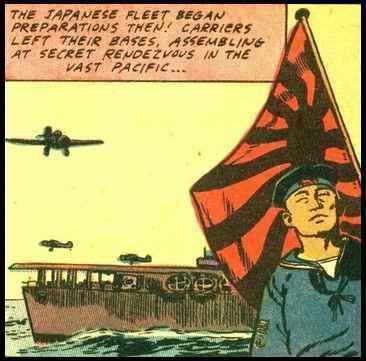
Countdown to Infamy (July 28–29): From the Diary of Captain Shigeshi Uchida, a member of the Operations Section, First Bureau, Naval General Staff dealing with operational planning:
Our Army advanced in southern part of Indo-China. The US freezing of Japanese assets caused the Japanese to give up the idea of going north and put all energies into the rich southern regions. In view of the above circumstances the outbreak of war should be 15 October, i.e., the Japanese would expect the commencement day of war to be 15 October. (Dillon)
Countdown to Infamy: US assets in Japan are frozen. Japanese assets in the Dutch East Indies are frozen and oil deals canceled. Now, almost 75% of Japan's foreign trade is at a virtual standstill and 90% of its oil supply has been cut off. The Japanese occupy French bases in Indochina. It is clear that the main use for these bases might be as jumping off places for an invasion of Malaya, the East Indies, or even the Philippines.
Holocaust: Nazi killing squads arrive in Bessarabia: Romanian troops and militias murder thousands of Jews in the area of their advance. Following the initial killings, internment camps are set up throughout the province. At the camp in Edineti, 70 to 100 people die every day in July and August, mostly of starvation. In all, more than 148,000 Bessarabian Jews perish in the ghettos and camps of Transnistria. (THP)
The German advance in Russia is so rapid that less than 300,000 of Russia's 2.7 million Jews are able to escape to safety beyond the Volga River. (THP)
1942 Resistance: The Jewish Fighting Organization (JFO) is set up in the Warsaw ghetto. (THP)
1943 World War II: Various:
Hamburg suffers a firestorm: On this day in 1943, the worst British bombing raid on Hamburg so far virtually sets the city on fire, killing 42,000 German civilians.
On July 24, British bombers launched Operation Gomorrah, repeated bombing raids against Hamburg and its industrial and munitions plants. Sortie after sortie dropped fire from the sky, as thousands of tons of incendiary bombs destroyed tens of thousands of lives, buildings, and acreage.
But the night of the 28th saw destruction unique in more than three years of bomb attacks: In just 43 minutes, 2,326 tons of bombs were dropped, creating a firestorm (a word that entered English parlance for the first time as a result of these events). Low humidity, a lack of fire-fighting resources (exhausted from battling blazes caused by the previous nights' raids), and hurricane-level winds at the core of the storm literally fanned the flames, scorching eight square miles of Hamburg.
One British flight lieutenant recalled seeing "not many fires but one... I have never seen a fire like that before and was never to see its like again." Despite the terrible loss of civilian life, there strange and awful irony: The horrific bombing runs affected Hitler's war machine only marginally. It did more to wound the morale of the German people and its army officers than it did to the production of munitions, which was back running full speed within a matter of weeks. (History.com)
The Man Who Told FDR About the Holocaust:
Seventy years ago this month, on July 28, an eyewitness to the Nazi atrocities against Europe's Jews brought the horrifying news directly to the most powerful man on earth. It was the moment that President Franklin D. Roosevelt came face to face with the Holocaust.
By the time he was 26, Polish underground member Jan Karski had been imprisoned by the Soviets, tortured by the Gestapo, and nearly drowned while escaping from a hospital in German-occupied Slovakia. After all he suffered, it would have been understandable if Karski had ended his service at that point.
Instead, he chose to risk his life again, in order to alert the Free World about Hitler's mass murder of European Jewry. . . .
Determined to tell the world what he had seen, Karski made his way across occupied Belgium, Germany, and France, his life in danger every step of the way. Thanks to an injection from a sympathetic dentist that swelled his jaw, Karski was able to avoid conversations that might have revealed his Polish identity. From France, he hiked across the Pyrenees mountains into Spain, and then traveled to London.
British officials were chilly. Foreign Minister Anthony Eden showed little interest in Karski's account of the slaughter of the Jews, and Prime Minister Winston Churchill sent word that he was too busy to meet the Polish courier at all. Karski headed for Washington. On July 28, 1943, he met with President Roosevelt, in the Oval Office, for more than an hour.
Karski began by describing the activities of the Polish underground. The president listened with fascination, asked questions, and offered unsolicited advice, some of it a bit eccentric—such as his idea of putting skis on small airplanes to fly underground messengers between England and Poland during the winter.
Then Karski turned to the plight of the Jews.
This was not the first time FDR heard about the mass murder of Europe's Jews. For nearly a year, detailed reports about the killings had been reaching the White House. In fact, when American Jewish leaders had their very first meeting with the president on this subject, in December 1942, FDR told them he was already "well acquainted" with the massacres they described. But the meeting with Karski was the first time President Roosevelt encountered an actual eyewitness to the killings.
Despite Karski's harrowing first-person account of the atrocities, the president was not moved. FDR was, as Karski politely described it, "rather noncommittal."
Roosevelt viewed the suffering of the Jews as just another unfortunate aspect of what civilians suffer in every war. He did not believe it was justified for the U.S. to use any resources to rescue Jews from the Nazis. Nor did he want to have to deal with large numbers of rescued Jewish refugees, clamoring to be admitted to the United States.
Ironically, though, just six weeks earlier, the Roosevelt administration had established a U.S. government commission "for the protection and salvage of artistic and historic monuments in Europe." [For further information, click here. Note: This is not intended as a personal attack on FDR or any other leaders whose countries owed no duty to the Jews of European countries. It does, however, lead to the conclusion that the Jewish people have only one way of protecting themselves—Ed.]
1944 World War II: Various:
US troops take Coutances in France: The objectives of Operation COBRA are met.
[The] newly arrived 4th and 6th armoured divisions, drove them off the panzers and captured the town. The victorious Shermans and White half-tracks pressed on. By dusk, they had established a new phase line up to fifteen miles south from that which Cobra had started four days earlier. The Americans had succeeded in breaking through the German defences. Bradley grasped on the 28th that he had won a great victory, and instead of consolidating and mopping up, he decided to maintain the pressure and thrust fresh troops into the gap he had opened.
Eastern front: Soviet troops are fighting for Brest-Litovsk in the Soviet Union.
1945 U.S. Senate approves United Nations charter:
In a ringing declaration indicating that America's pre-World War II isolation was truly at an end, the U.S. Senate approves the charter establishing the United Nations. In the years to come, the United Nations would be the scene of some of the most memorable Cold War confrontations between the United States and the Soviet Union.
In 1919, following the close of World War I, President Woodrow Wilson implored the U.S. Senate to approve the charter for the League of Nations. Postwar isolationism and partisan politics killed U.S. participation in the League, however. In July 1945, with World War II coming to a close, the U.S. Senate indicated the sea change in American attitudes toward U.S. involvement in world affairs by approving the charter for the United Nations by a vote of 89 to 2. President Harry S. Truman was delighted with the vote, declaring, "The action of the Senate substantially advances the cause of world peace." Acting Secretary of State Joseph Grew also applauded the Senate's action, noting, "Millions of men, women and children have died because nations took to the naked sword instead of the conference table to settle their differences." The U.N. charter would provide the "foundation and cornerstone on which the international organization to keep the peace will be built." Once the charter had been ratified by a majority of the 50 nations that hammered out the charter in June 1945, the U.S. Senate formally approved U.S. participation in the United Nations in December 1945.
Whether the United Nations became a "foundation and cornerstone" of world peace in the years that followed is debatable, but it was certainly the scene of several notable Cold War confrontations between the United States and the Soviet Union. In 1950, with the Russians absent from the U.N. Security Council, the United States pushed through a resolution providing U.N. military assistance to South Korea in the Korean War. And in one memorable moment, during a speech denouncing Western imperialism in 1960, Soviet leader Nikita Khrushchev took off one of his shoes and pounded his table with it to make his point. (History.com)
Plane crashes into Empire State Building: A United States military plane crashes into the Empire State Building on this day in 1945, killing 14 people. The freak accident was caused by heavy fog.
The B-25 Mitchell bomber, with two pilots and one passenger aboard, was flying from New Bedford, Massachusetts, to LaGuardia Airport in New York City. As it came into the metropolitan area on that Saturday morning, the fog was particularly thick. Air-traffic controllers instructed the plane to fly to Newark Airport instead.
Upon impact, the plane's jet fuel exploded, filling the interior of the building with flames all the way down to the 75th floor and sending flames out of the hole the plane had ripped open in the building's side. One engine from the plane went straight through the building and landed in a penthouse apartment across the street. Other plane parts ended up embedded in and on top of nearby buildings. The other engine snapped an elevator cable while at least one woman was riding in the elevator car. The emergency auto brake saved the woman from crashing to the bottom, but the engine fell down the shaft and landed on top of it. Quick-thinking rescuers pulled the woman from the elevator, saving her life.
Since it was a Saturday, fewer workers than normal were in the building. Only 11 people in the building were killed, some suffering burns from the fiery jet fuel and others after being thrown out of the building. All 11 victims were workers from War Relief Services department of the National Catholic Welfare Conference, into the offices of which the plane had crashed. The three people on the plane were also killed.
An 18 foot by 20 foot hole was left in the side of the Empire State Building. Though its structural integrity was not affected, the crash did cause nearly $1 million in damages, about $10.5 million in today's money. (History.com)
1960 Space race: Another attempt (See: May 15, 1960) is made by the Soviets to launch a satellite capable of housing humans, with two dogs, Chayka and Lisicha, on board. This time the recovery system functions perfectly and the dogs are safely recovered.
From a 11/17/71 interview of Dr. Wernher von Braun conducted by Roger Bilstein and John Beltz:There is probably less competition in the Soviet launch vehicle program than in this country. The relationship between the space people, the space program people, and the Soviet Union, and the rocket people, is probably best compared with the relationship we have between these two groups in this country during the Gemini program where, as you will remember, NASA built spacecraft but went to the Air Force to request Titan II launch services for Gemini spacecraft.
The launching itself of Gemini spacecraft was done largely by blue-suiters. And it was only in the Apollo program that we brought a launch vehicle into the process that had no military history at all. Remember, even the Mercury used Atlas launch vehicles, and the Redstone rocket preceded Atlas very early—Alan Shepard's and Gus Grissom's flights had a military history. The Saturn V was really the first launch rocket that was a baby of NASA and not the military—a military child.
Now the entire family of Soviet launch vehicles up to this point was really developed under military auspices. They have the so-called Strategic Rocket Command in the Soviet Union, comparable to our Strategic Air Command, and they are really the sole owners of rocketry, you might say. And the space people go to them for booster service, just like NASA went to the Air Force for Atlas' and Gemini's.
The industrial complex—if that's what you want to call it—state-controlled economy undoubtedly doesn't have as many facets as the American aerospace industry. In other words, they don't have their Boeing's, and North American Rockwell's, and Douglas's, and so forth, to build competing systems. But it was, and I believe still is, a more monolithic operation. With that I am not saying there's no competition at all. I think there's every indication that within that monolithic industrial structure there are some competing teams. You see that in their aviation industry . . . .
Nevertheless, I think it is far more monolithic—and that also means that, shall we say, there are less checks and balances in this. In NASA, you could always tell the Boeing people, "Look, the Douglas people brought something in here which, in our opinion, greatly enhanced the liability of something," and vice versa. So the government was in the fortunate position that it could effectively cross-feed ideas that came out of these various pots.
When you have a very monolithic organization, that is one, shall we say, like a military establishment, you have less and less of that. There is, at the end, one man responsible for all these things. You know, the Russians always mysteriously refer to "the chief constructor," or "the chief engineer," whoever that man is . . . . We have never run the Saturn V program like that in NASA. I think we considered ourselves far more like a stock exchange of good ideas where we felt we picked the best things out of all these things and cross-fed them for maximum benefit of the whole.
1968 Death: Otto Hahn: German chemist: He received the 1944 Nobel Prize in Chemistry. After World War II Hahn was among those German scientists put under surveillance by the Allied Alsos program who suspected him of working on the German nuclear energy project to develop an atomic bomb (his only connection was the discovery of fission, he did not work on the program). In 1945 Hahn was awarded the 1944 Nobel Prize in Chemistry, but at the awards ceremony the chairman of the Nobel Committee for Chemistry announced, "Professor Hahn has informed us that he is regrettably unable to attend this ceremony." He was being held prisoner by the British as part of Operation Epsilon, who were seeking information from him about the failed German effort to develop an atomic bomb.
Edited by Levi Bookin (Copy editor)
levi.bookin@gmail.com



Click to join 3rdReichStudies



Disclaimer: This site includes diverse and controversial materials—such as excerpts from the writings of racists and anti-Semites—so that its readers can learn the nature and extent of hate and anti-Semitic discourse. It is our sincere belief that only the informed citizen can prevail over the ignorance of Racialist "thought." Far from approving these writings, this site condemns racism in all of its forms and manifestations.
Fair Use Notice: This site may contain copyrighted material the use of which has not always been specifically authorized by the copyright owner. We are making such material available in our efforts to advance understanding of historical, political, human rights, economic, democracy, scientific, environmental, and social justice issues, etc. We believe this constitutes a "fair use" of any such copyrighted material as provided for in section 107 of the US Copyright Law. In accordance with Title 17 U.S.C. Section 107, the material on this site is distributed without profit to those who have expressed a prior interest in receiving the included information for research and educational purposes. If you wish to use copyrighted material from this site for purposes of your own that go beyond 'fair use', you must obtain permission from the copyright owner.
Please Note: The list-owner and moderators of 3rdReichStudies are not responsible for, and do not necessarily approve of, the random ads placed on our pages by our web server. They are, unfortunately, the price one pays for a 'free' website.